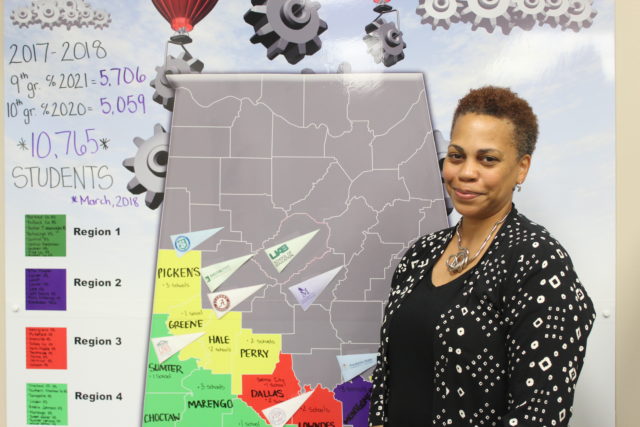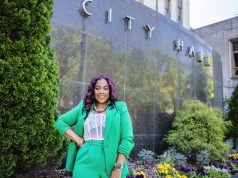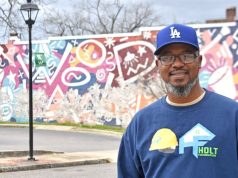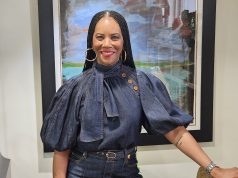By Ariel Worthy
The Birmingham Times
Samantha Elliott Briggs, PhD, has always identified herself as a social-justice educator. It’s in her blood.
“My father, [Forriss Elliott], was the legal redress chairman for the National Association for the Advancement of Colored People [NAACP] in St. Louis, [Mo.],” she said. “He was a civil rights attorney …, one of the attorneys on the desegregation case [for schools] in St. Louis. … If there was a picket line, if there was a demonstration, anything, my parents were there—and we were right there with them.”
Briggs is currently the project director of Gaining Early Awareness and Readiness for Undergraduate Programs (GEAR UP) Alabama, a seven-year grant awarded to University of Alabama at Birmingham (UAB) School of Education by the U.S. Department of Education.
The goal of the program is to increase the number of underrepresented minorities who are ready and can be successful in postsecondary education options; it provides college and career readiness for children from the sixth and seventh grades through high school.
“We started with students when they were in sixth and seventh grades, and we will see them through 2020 and 2021,” Briggs said. “We’ll follow 2020 graduates through their first year of college and 2021 graduates through their senior year of high school.”
GEAR UP Alabama serves 42 high schools in 17 counties, mostly in the state’s Black Belt region, offering comprehensive mentoring, counseling, and advising, as well as career counseling, tutoring, and test prep.
Taught by the Best
Having a father of such prominence was “fun, empowering, and scary all at the same time,” Briggs said.
“My father was quite the character in the courtroom. He loved [the television show] ‘Perry Mason,’ and, in my childhood opinion, he aimed to be just as theatrical [as its lead character, a fictional criminal defense attorney],” she said. “When he had really big cases, he would check us out from school for the opening and closing arguments.”
Briggs’s father was among the many attorneys who worked toward the desegregation of the St. Louis City and St. Louis County school systems. He was instrumental in establishing a student transfer program in 1983 that allowed African-American students living in the inner city to attend suburban schools and for non-African-American students living in suburban areas to attend magnet programs in the inner city. The program was known as the Voluntary Interdistrict Choice Corporation (VICC).
“There were so many layers of irony in this situation,” Briggs recalled. “I lived a very privileged life. My father was an attorney, my stepmother was a physician, my mother was a model and an arts enthusiast. We lived on a private street in a 7,480-square-foot home. I attended a neighborhood private school that has a current tuition rate of $19,930. And we were exposed to everything imaginable.
“Nevertheless, I wanted to be ‘normal’ and attend public schools like most of my friends. When the VICC program was established, my father allowed us to apply for the transfer. My brother entered the St. Louis County Schools in the Parkway School District in the year of inception as a ninth grader. I entered the following year as a sixth-grade student during the 1984 to 1985 school year.”
To get to school, Briggs and her brother crossed picket lines of whites, blacks, and Asians protesting the arrival of the “poor, black, city kids.” Even more, when they got to school, they had to enter through the back of the building.
Family Ties
Brigg’s father was a force, and her mother was equally as impressive.
“My mother started college in 1957 at Bradley University in Peoria, Ill., …[and] dropped out after her freshman year. … My dad went to Howard [University in Washington, D.C.] My mother became the first African-American airline attendant for [the now defunct] Mohawk Airlines, she [also was] a supermodel for Conde Nast [magazines] and was the first African-American model in the New York Times Magazine.”
Legacy of Social Consciousness
Following the example of her parents, Briggs has raised her three children—Chane, Micah, and Elijah—to be socially conscious.
“Anything that was going on social-justice-wise, we were there. And, just as my parents did, my husband and I did the same with our kids,” she said.
In fact, after recently seeing footage of herself and her husband at a 1999 rally, Briggs said, “I was like ‘Wow! We’ve been doing this for a while.”’
She even drove her children and husband to St. Louis in 2014, after 18-year-old Michael Brown was shot and killed by a police officer in the St. Louis suburb of Ferguson.
“I’m from St. Louis, and my dad was a judge in Ferguson,” she said. “I put my kids in the car, and we drove home, so they could pay homage right there in [Brown’s] neighborhood. Trying to have [socially] conscious children has always been part of my work as a mother and as a community servant.”
Briggs said the Brown case “revealed the ugly racial history of St. Louis. I grew up in it. My family was negatively impacted by the exact same prosecutors who tried to sweep the Ferguson trauma under the rug.”
“I feel so much safer in Alabama, believe it or not,” she said. “I believe you know what you’re dealing with and who you’re dealing with here. Back home, you didn’t find out until it was too late.”
Briggs graduated from Clark Atlanta University, where she earned a bachelor’s degree in early childhood education. She then attended the University of Alabama, where she earned a master’s degree in women’s studies and a doctorate in instructional leadership with a concentration on social foundations of education. She also is the author of the teachers’ curriculum at the Birmingham Civil Rights Institute (BCRI).
“I was actually introduced to the Institute by my daughter, Micah, when she was in middle school and participating in PEACE Birmingham and the Birmingham Pledge Association,” she said. “Her meetings were at the BCRI, and I’d sit and chat with [the staff] while the students were engaged in their activities. The more they learned about me and my interests and work, they began finding work for me.”
At the time, Briggs was new to Birmingham and teaching as an adjunct professor of sociology and women’s studies at UAB and Samford University. Her daughter completed the Legacy Youth Leadership Program in 2014, and her son completed the program this past summer.
“They have grown up in the BCRI, and it has been so transformative,” she said.
One-Person Team
Briggs also worked for the Southern Poverty Law Center (SPLC) and helped with a program called Mix It Up at Lunch Day (MIU), which aimed to get students to not let anyone sit alone during lunch hours.
“The Mix It Up at Lunch Day program began in the early 1990s,” she said. “MIU believed that the lunch hour was the most segregated hour of the school day, much like [the Rev. Dr. Martin Luther King Jr.] found [Sunday morning church worship services] the most segregated hour of the week.
“I was a one-person team under the [SPLC’s] Teaching Tolerance umbrella, and the program became an online-only entity in 2009 after the economy dropped. We served tens of thousands of children across the country.”
Fulfilling Work
Besides parenting, Briggs said being director of GEAR UP is one of the most fulfilling things she’s ever done. Seeing the program’s potential impact on students, many of whom could be first-generation college students in their families, is especially enjoyable.
“The earlier we introduce and expose students to postsecondary ideals, the better,” she said. “We begin in middle school and follow the students through high school graduation, but it would be amazing to start this work in elementary school. We are demystifying college and career options for students who may not have anyone to support their dreams and pave the way.
“When you think about the Back Belt and all the stories connected to these families, it seems as though sometimes they have been forgotten. It seems as though sometimes people don’t want anything different.
“I see GEAR UP as an opportunity. You have to go into a community and have the community join you in doing something so that they may obtain the behaviors for success.”
Briggs recalls one student, in particular—a young man from Pickens County.
“[He] sat in the second row during a recent bus trip. He was a football player, and he was being goofy, teasing [us] because we were trying to hype up [the students]. Fifteen- and 16-year-olds are going to crack on you.
“During a recent conference, he came up to me and said, ‘Hey, Dr. Briggs, I wanted to see what you think about my plan. I’m going to use my scholarship for welding, but it’s not really what I want to do. Welding pays decent, but I’m going to save up my money and go to a four-year college. I’m going to study music and TV producing.’
“I said to him, ‘Did you know there are two-year colleges that have music and television production?’
“He said, ‘What? Are you serious?’
“I said, ‘Yeah, Lawson State [Community College (LSCC)] has an amazing program. They also have dorms, which means you can stay on campus.’”
Briggs’s husband, Calvin Briggs, EdD, was at the conference, as well—he is director of LSCC’s Science, Technology, Engineering, and Mathematics (STEM) programs—and he took time to speak with the young man.
“Next thing I know, I see [the student] taking notes and exchanging contact information,” she said. “We were noticing that when we’re with the kids, they’re doing what we taught them to do. They are taking notes. They are following up with contacts. They are advocating for themselves because that’s part of this. We can’t follow them everywhere, so we teach them that they have to speak for themselves, they have to learn how to advocate for themselves and ask for what they want and need.”
Birmingham
Given her Civil Rights background, how does Briggs see Birmingham?
“I feel comfortable here for a variety of reasons,” she said. “It’s within 200 to 250 miles of some of our favorite cities. It’s small and comfortable enough to raise a family, yet it has enough culture to keep us connected to what we miss in the big cities.
“I see Birmingham as an amazing place for up-and-coming African-Americans. Atlanta has too many big fish in a manmade pond. Birmingham is a wondrous place for magical unicorns like me!”




